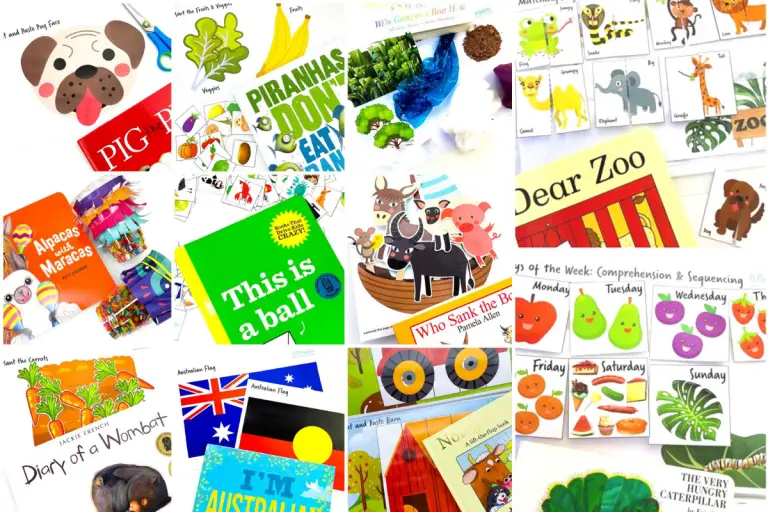Tips Encouraging Speech and Language Development
Disclosure: This blog contains affiliate links which I may earn a small commission from if you purchase through them, at no extra cost to you.
Here are 10 tips that you may take into account for assisting your little ones to develop their speech and language development.
The best tool to encourage healthy speech and language development is YOU!

Tips encouraging speech and language development
Speech is a huge part of our society’s means of communicating. Your child’s first words are exciting. That being said, if you have any concerns regarding your child’s speech, early intervention during the early years can make a huge difference.
That being said, unfortunately, given the huge demand for these services, waitlists can be long.
While waiting for the support of a professional, there are plenty of things you can do from home to support your child’s speech and language development.
These certainly are not intended to replace the advice of a professional. If you do have concerns about your child’s speech development, please consult with your family doctor.
Tips for encouraging babies and toddlers to talk
How you can encourage speech development
1. Limit Screen Time
Turn off the screens.
Children cannot learn speech or social skills from watching TV.
There are very few programs that a child may benefit from watching.
Children are sensory learners and thrive with active engagement with real people and their surroundings.
Research shows that children who are high screen users prior to school age are at higher risk of poorer language development and cognitive delays. These children are less likely to be developmentally ready for school.
This will have a massive impact on their ability to learn within a school environment.
2. Be a Role Model
Be a positive role model for your children.
Take the time to pronounce your words clearly and precisely.
When addressing your child, ensure you make eye contact and where possible, kneel down to their level so you are not talking down to them.
If they make a mispronunciation, simply repeat what they have said but in the correct grammar and pronunciation.
This validates that you have understood what the child had been trying to communicate and keeps the conversation flowing.

3. Read all the Books
There is so much evidence showing that exposure to books from an early age has a huge positive impact on a child.
Read to your children!
Push the boundaries of their imagination, take them to magical places, introduce them to unique characters, and build their own creativity and understanding of how the world works all through the reading of books.
When reading to your child, make it fun by adding tone and expression to your voice.
Books are very helpful aids in teaching your child social, speech,
4. Sing with your Child
The singing
Pair them up with actions and you are putting meaning to the words all while having a great time just having fun!
5. Build on their Existing Abilities
Add context to what they are saying.
Adding verbs and adjectives to their “phrases” will help build their vocabulary and understanding of what they are talking about.
It will also show them that you are interested in what they are saying which is a great confidence boost for them!
Child: “Bird”
Caregiver: “Yes, that is a black bird”
Child: “Black bird”
Caregiver: “The black bird is flying in the sky”
Child: “Black bird sky”
Caregiver: “Yes, it’s a lovely big, blue sky isn’t it?”

6. Commentate
Commentate on your child’s play.
Avoid asking questions all the time but also take the time to just comment on what they are doing.
This allows the child to concentrate on what they are doing without having to stop their play to respond.
It also allows the child to build up their understanding of what they are doing and put words to actions, items, places, etc all while building their vocabulary.
7. Encourage Role Play
Allow your child to explore the parameters of their voice through role play.
Take on the personality of a great, big, grumbly monster, deepen your tone and encourage your child to join in! When playing with figurines, match the voices to a personality!
The princess speaks with a soft, soothing voice whereas the dragon has a loud, drawn-out tone to his.
Playing with different tones will encourage your child to form different shapes with their mouths, position their tongues in different spots, and is great fun!
Build cherished memories, creativity, imagination, and skills that will be used for the rest of their lives!
8. Limit the Use of Dummies/ Pacifiers
Prolonged use of dummies may delay speech development along with the maturation of the muscles within the mouth.
The action of sucking on a dummy is appropriate for an infant not so much for a baby who is entering the beginning of eating solid foods and speech.
This skill needs to evolve to enable proper speech through the advancement of muscles and proper tongue placement.
The same can be said for prolonged use of teats and sippy cups.
Straw and normal cups require a different motion to the immature action that is used to suck on the teat of a bottle.
Drinking from a cup will encourage the development of motor skills that will aid in advancing speech.
9. Get in the Kitchen and Start Conversations
Getting into the kitchen with your children is a great way to help build a healthy relationship with food. It is also a great platform to build up speech.
While cooking you may discuss ingredients and where they come from, colours, shapes, and processes.
10. Offer a Variety of Textures
When chewing food your cheeks, lips, tongue, and jaw use different actions for different foods.
It is the same motor skills used for chewing that are used for speech!
Explore different textures to not only build a sound connection with food but fine-tune those muscle groups used for verbal communication.

What activities encourage speech development
One of the most important factors when trying to encourage any kind of development is that the children enjoy what they are doing!
Play to their interests and take the time to be a part of their activities even if at times it is just as a spectator!
- Toy figurines or open-ended loose parts can transform into wonderful characters to encourage role-play. They offer boundless opportunities for play and are a great tool to inspire communication.
- Zoo animal playsets are a great opening into the world of phonics! Create social scenes with the animals and join your child in roaring with the lion, hooting with the monkey, snap snapping with the crocodile! While they are playing, your child is making different sounds, and experimenting with different muscle formations- all helpful for speech and language development.
- Play charades. Expand on typical language used and add loads of descriptive language
- Sing songs. The rhythm and rhyme of songs makes them easier to memorise thus improving a childs vocabulary. Dancing around to music while singing also creates beautiful memories too
- Play ‘what if’ story telling games. “What if you were a magician, what magic would you do?” This encourages descriptive langugae and cognitive processes.
- Play with puppets. Make a puppet show showcasing a favourite book or just go with the flow making it up as you go!
- Wo.rd chains can be turned into a fun game while in the car. Simply start off by saying a word and the other person says the first thing that comes to their mind when they hear it. Continue back and forth. This is a great way of exposing children to new words and descriptive language
- Create story boards from magazine cut outs. Repurpose the good old junk mail to create some story boards. These can be premeditated before being stuck down. Asking questions about which would be the best cut out for the beginning middle and end and asking why will open up loads of conversation
How can language development be improved?
Use language! Incorporate language into everyday tasks.
- Talk, read and sing with your child every day.
- Ask questions and encourage your child to ask questions.
- Make up stories and be a part of your child’s play. Follow their interests and even use their interests to engage them in activities that will encourage the use of speech.
- Offer positive feedback when they have persited to recall a word that didn’t come to them straight away, or when they used appropriate grammer, pronouns or pronouciation
- Make a photo book with images of day trips and adventures. Ask your child what they remember using the photos as prompts
- Use ‘choice questions’ to encourage the use of oral language. “Would you like a bath or shower?” or “Would you prefer vegemite or peanut butter on your toast?”
How do you support language development in the early years
You can support your child speech development through their early years by being a good role model.
Children learn so much through imitation of those around them. Demonstrating age-appropriate speech and language skills to your child is very powerful and valuable.
- Pronounce your words correctly and clearly
- Use correct names for things
- Communicate with your child at their level, kneeling to talk to them
- Correct your child by simply repeating the sentence with the correct grammar
- Repeat sentences back to children, adding descriptive language
- Commentate what you’re doing
- Commentate what your children are doing
- Be present and listen to understand
How can I help my child with speech therapy at home
If you are concerned about your child’s speech, consult your health professional.
This may start with your family doctor who may refer you to a speech therapist.
Waitlists can be extensive however there are some things that you can do at home to support your child’s developing speech and language skills.
Here are some activities you can do with your child to help with your child’s speech therapy at home.
- Practice through song. “L is for lion, l – l- l lion. F is for flower, f-f-f flower” Create a focus on tongue placement and lip positioning when making the individual sounds. Even watching themselves in the mirror can be a fun and efficient way of engaging your child in proper muscle positoning while making sounds
- Stay positive. Focus on reinforcing those little achievements along the way
- Keep background noise to a minimum while engaging in speech practice. Having noise such as TV or radio playing in the background can be over stimulating and distracting.
- Encourage your child to take their time in atriculating what they are trying to say.
- Read books together. Examine the illustrations, ask your child what they think may be happening or what may happen next. Books without words can be powerful tools to decipher unwritten language.







